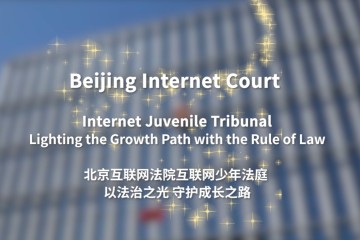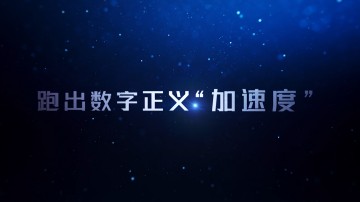BIC reinforces protection of personality rights with impartial justice
With the development of internet technology, new types of online infringement continue to occur. The Beijing Internet Court (BIC) has striven to strengthen the protection of personality rights and promote law-governance in cyberspace by hearing relevant cases, publishing typical cases, carrying out legal popularization activities, and strengthening relief and prevention.
Setting up a lottery to reward forwarding insulting content online will bear heavier infringement liabilities
The defendant, surnamed Li, posted an insulting article online against the plaintiff, surnamed Zhao, and set up a lottery for those forwarding the article, which attracted some online attention. Since the publishing of the article, Zhao started to receive private messages from netizens, most of which were abusive and attacking, inflicting grave stress on Zhao. Zhao thus sued Li at the BIC.
After trial, the BIC determined that Li's behavior infringed upon Zhao's right to reputation, and ruled that Li should issue an apology letter to Zhao on the social platform and compensate Zhao for the mental stress caused.
The right to reputation is one of the personality rights enjoyed by natural persons, and no one is entitled to damage other's right to reputation by means of insulting and slandering, said Yan Jun, a judge at the BIC's 3rd Comprehensive Division, adding that the case stood out as the defendant had set up a lottery that would expand the scope of dissemination of the infringing content, intensify the infringement and aggravating the consequences, therefore the defendant should bear heavier infringement liabilities.
Online platforms must handle negative information in a timely manner; online influencers should conduct higher duty of care when posting online
The defendant, surnamed Wu, used dirty words to insult the plaintiff, surnamed Gu, in an online social group consisting of 995 people. Through his lawyer, Gu sent a lawyer's letter to the mailbox designated for legal affairs of the company responsible for the operation of the social platform, requesting to ban and dismiss the group, and to handle the related information by such means as deletion, blocking, and disconnecting the links.
It took the company over three months to shut down the group. Gu thus claimed the company should bear joint liabilities for not deleting the infringing content in a timely manner upon notification.
After the trial, the BIC determined that when discovering negative information, hosts of online social platforms should take necessary and timely measures such as deletion and blocking, to protect the legitimate rights and interests of online users. If online service providers fail to take those measures in a timely manner upon notification, they shall be jointly liable with the online content publisher for the enlarged part of the damage.
The BIC ruled that the company should issue a written apology to Gu within seven days after the judgment took effect, and assume joint liability within 50 percent of Gu's mental stress compensation payment to Gu.
In another case, Liu, an online influencer on legal affairs on Weibo, suffered abuse from another Weibo user, surnamed Sun, who sent abusive words via private messages to insult Liu and his family, due to differences of opinion. Liu publicized their private chatting record online, as well as Sun’s photo and Weibo account information, and counterattacked Sun with a large amount of insulting words, causing major online attention, commenting and forwarding.
To stop the situation from getting worse, Sun delivered an apology to Liu multiple times via private messages. Liu didn't accept the apology and sued Sun at the BIC. Sun filed a counterclaim in response.
After trial, the BIC determined that Sun damaged Liu's personal dignity by sending him private messages which were abusive and highly insulting, committing infringement upon Liu's general personality rights. Liu as an influencer on Weibo, used insulting words against Sun and published Sun's photo as well, which was beyond reasonable limits and infringed upon Sun's rights to reputation and portrait. Considering the degree of fault of both parties, the specific ways of infringement and their scope of impact, the court ruled that Liu should delete all the related postings and comments, the two sides should apologize in writing to each other and the amount of compensation for mental stress offset.
It was found from the trial that content published by online influencers tends to spread fast with irreversible consequences. Therefore, those influencers should conduct a higher-level of duty of care, and exercise their influence with caution, said Zhao Ruigang, vice-president of the BIC.
Properly apply injunctions on infringement of personality rights for relieving and preventative purposes
For nearly a year, the defendant, surnamed Xiao, posted a numerous videos against the plaintiff, surnamed Dong, in his 40 plus livestream sessions, using abusive and vulgar language, name-calling and personal attacks. After the court hearing, Xiao continued to post infringing words every night in his livestream sessions despite being informed by the court not to do so. Therefore Dong filed an application for an injunction on personality right infringement at the Beijing Internet Court.
Considering Xiao's previous behavior, he was committing infringement and would much likely continue to do so. Given the high viewership of the livestreaming involved, if not stopped in time, it would further expand the infringement consequences. Therefore, the BIC issued the injunction quickly.
The injunction on personality rights infringement established in the Civil Code aims to achieve the realistic protection of the infringed party by stopping the continuation of harmful acts in time, said Yan. In internet-related cases involving personality rights infringement, the dissemination of infringing information could infinitely amplify. The application of injunctions is conducive to the timely stopping of infringement and the protection of the legitimate rights and interests of the infringed party.
How to balance the protection of personality rights and freedom of speech in such cases is a hot topic of social concern. According to Zhao, in the process of such trials, due consideration will be given to the legitimate restrictions in the exercise of personality rights, including the expression of speech for the purpose of public interest, specific consideration of public figures, and the supervision of news reports and public opinion. Commenting on and criticizing other’s words and deeds online, as long as it is not abusive and slandering, should not be considered infringement, even if the view is biased.

 Judicial White Paper
Judicial White Paper
 Play
Play Play
Play Online Lawsuit Guide
Online Lawsuit Guide Beijing Internet Court Lawsuit Service WeChat Account
Beijing Internet Court Lawsuit Service WeChat Account  Beijing Internet Court WeChat Account
Beijing Internet Court WeChat Account